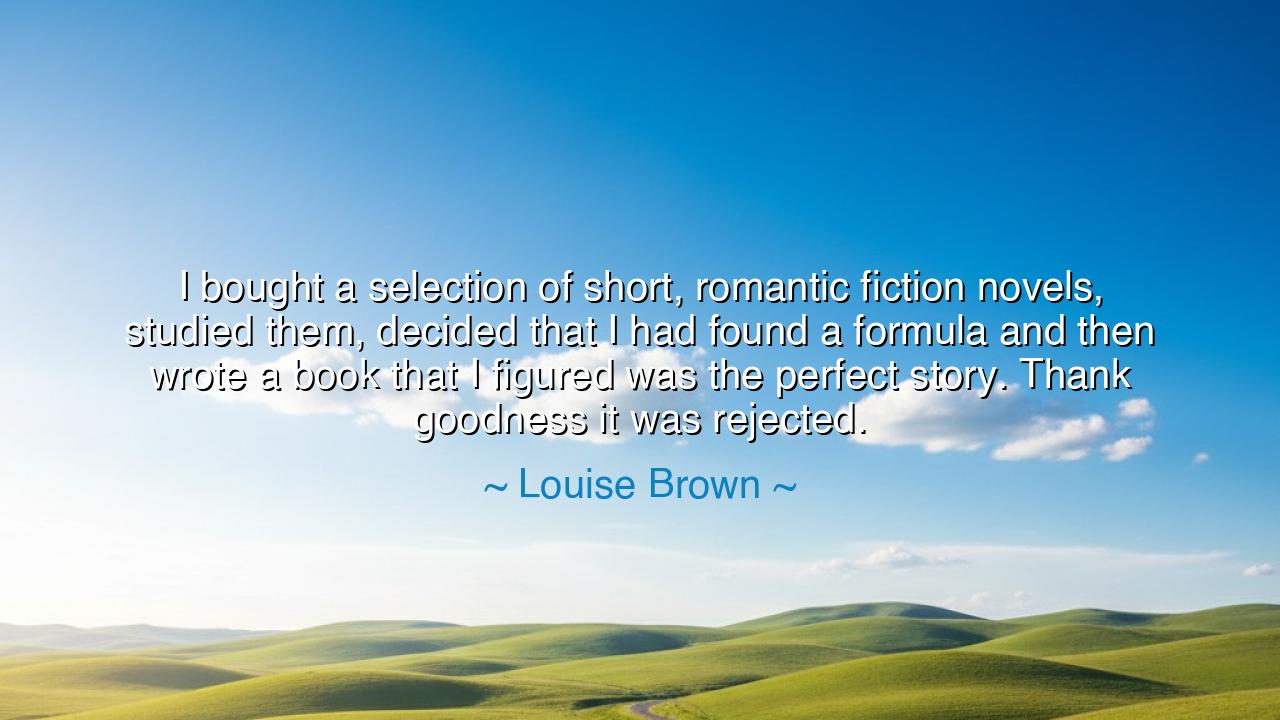
I bought a selection of short, romantic fiction novels, studied
I bought a selection of short, romantic fiction novels, studied them, decided that I had found a formula and then wrote a book that I figured was the perfect story. Thank goodness it was rejected.






"I bought a selection of short, romantic fiction novels, studied them, decided that I had found a formula and then wrote a book that I figured was the perfect story. Thank goodness it was rejected." – Louise Brown. In these words, Brown reveals an essential truth about creativity: that formulaic approaches, though they may seem efficient and effective, often fail to capture the heart of true artistic expression. In her acknowledgment of the rejection of her work, Brown finds a lesson not just in failure, but in the importance of authenticity and the dangers of relying on predetermined patterns in the pursuit of creativity.
In the ancient world, great artists and philosophers knew that true mastery could never be achieved through mere imitation. Plato, in his Republic, spoke of the artist as someone who must see beyond mere representation of the world and seek the ideal—the deeper truths that lay beyond appearances. In this sense, Brown’s experiment with romantic fiction formulas mirrors the story of a young artist trying to perfect their craft by adhering too strictly to the rules and patterns of others. Like the ancient sculptor who would seek to carve the perfect statue, it is easy to become consumed with the structure of the work, forgetting that the soul of the art must be original and personal.
Similarly, Aristotle in his Poetics emphasized the role of the individual voice in creative work. He understood that true tragedy, epic, or comedy arises not from following a script, but from understanding the complexities of the human condition. A play, for example, is not simply a set of actions based on formulas, but a living expression of the human soul. Brown’s rejection was a necessary reminder that stories, especially romantic tales, must not be bound by formulas or expectations but must emerge from a place of truth and experience—something that cannot be artificially manufactured.
The story of William Blake, the poet and artist, offers another striking example of how art cannot be confined to a mold. Blake was often rejected by the artistic establishment in his time because his work defied conventional forms. His visionary poetry, illustrated by his own etchings, was deeply personal and often difficult for contemporary critics to appreciate. Yet, Blake’s commitment to originality and his refusal to conform to established norms ensured that his work would be remembered not as a mere imitation, but as a profound expression of truth. Like Blake, Brown’s rejection allowed her to step back and realize that true creative expression is born not from formula, but from the heart.
What Brown’s reflection teaches us is that creativity—whether in art, literature, or life—is not a mechanical process of following steps, but an organic one of discovery and growth. It is in the moments of failure, the moments when we are forced to step away from the predictable and the safe, that we often find our most profound insights. By seeking to mimic the structures of others, we risk losing the genuine spark of our own creativity. Brown’s recognition that her formulaic approach was insufficient, and her subsequent acceptance of rejection, was an essential step in her journey toward true artistic freedom.
The lesson here is not to shy away from structure or form entirely but to approach them with the understanding that true creativity often lies beyond the constraints of external expectations. Just as the great philosophers and artists of old rejected rigid forms to find their unique expressions, we too must embrace the uncertainty and imperfection that come with genuine creation. To simply follow a formula is to surrender to the mundane; to break free from it is to embrace the full depth of what it means to create something truly new.
In our own lives, we should seek to follow Brown’s example of learning from rejection. Failure does not define us, but rather reveals the ways in which we can grow, evolve, and discover our unique voice. Whether in writing, art, or personal expression, it is important not to become entranced by the allure of simplicity or ease, but to challenge ourselves to go deeper, to find the stories that belong uniquely to us. By embracing authenticity and moving beyond imitation, we open the door to creations that are genuine, powerful, and enduring.
Thus, let us honor the wisdom in failure and in the rejection of formulaic thinking. True creativity is found not in easy answers, but in the courage to explore, to fail, and ultimately to create in a way that is uniquely our own. May we remember that originality is not born from the desire to please others or to follow the rules, but from the strength to listen to our own voices and express the deepest truths of our experience.






AAdministratorAdministrator
Welcome, honored guests. Please leave a comment, we will respond soon